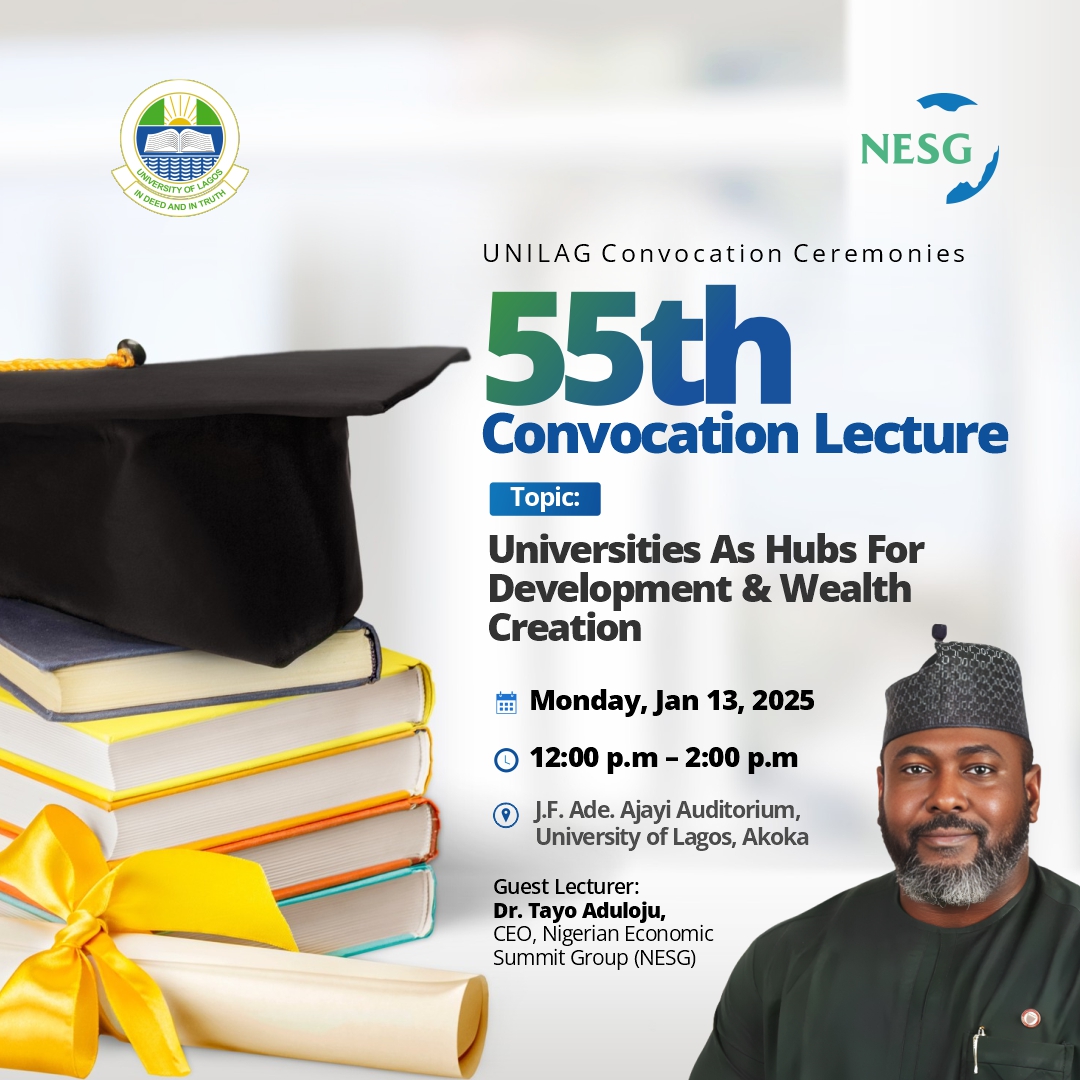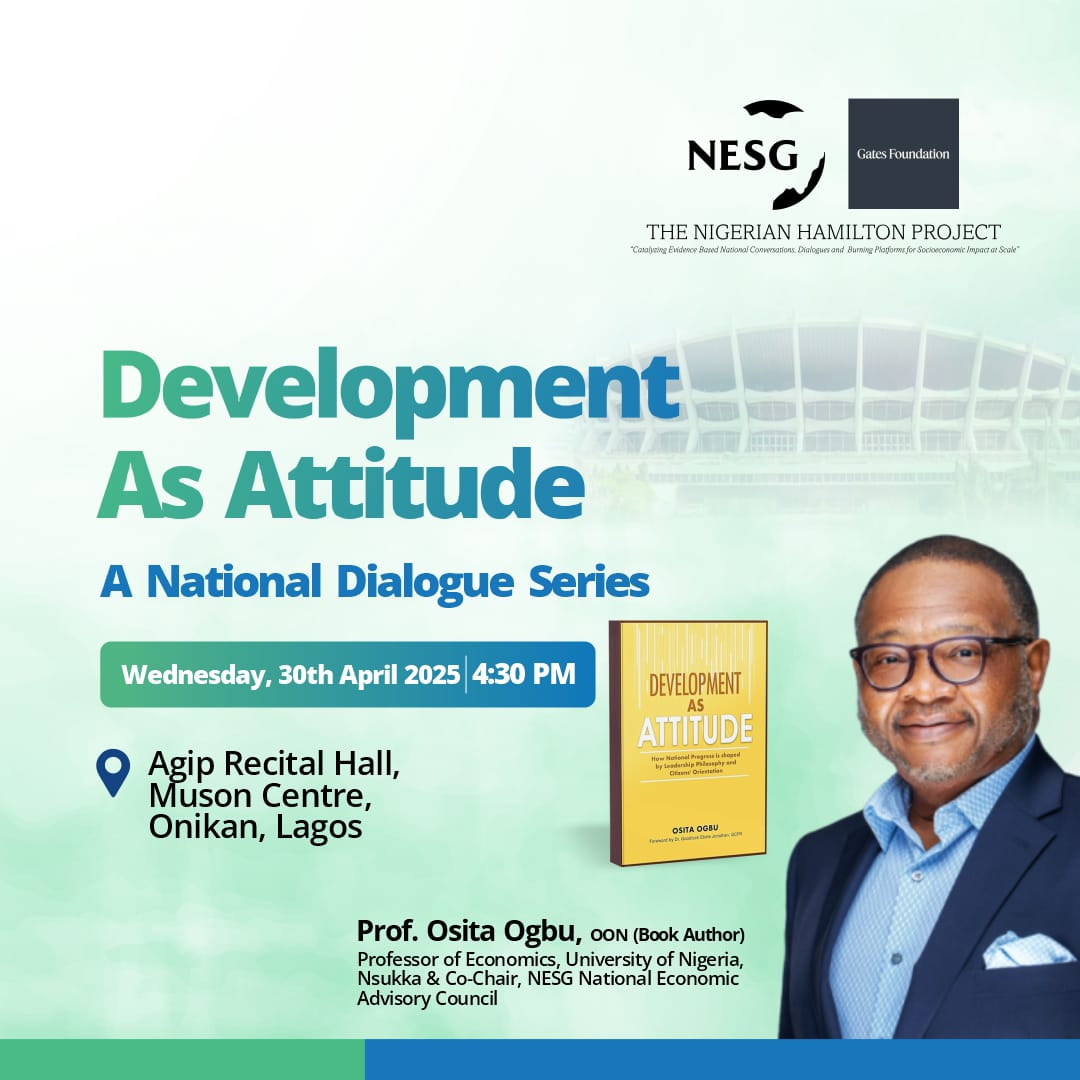Posted Mon, Jan 13, 2025 3:42 PM
55th UNILAG Convocation Lecture by Dr Tayo Aduloju

INTRODUCTION
As I considered the invitation to give the 2025 Convocation Lecture, I recalled my early training as a seminarian. This made me reflect on the purpose and meaning of the convocation. Originally, convocation referred to a gathering of church officials in the early days of the Church of England. The Convocations of Canterbury and York were meetings for these church leaders until the Church Assembly was formed in 1920. However, Oxford University was the first to use the word "convocation" in 1577 to describe a gathering of its graduates. Today, convocation ceremonies are held worldwide to welcome students into the scholarly community. The term "convocation" comes from the Latin word "convocare," which means "to call together." It is also rooted in the Greek word ἐκκλησία (ekklēsia), meaning an assembly. Whether for church or academia, the tradition of the convocation lecture carries the critical responsibility of sharing the significance and dedication of the diverse members involved.
The University of Lagos, with its rich history and commitment to academic excellence, stands as a beacon of hope and inspiration for the future of our nation. This convocation lecture is an important and respected event, and I genuinely value being invited to speak here. The University of Lagos Convocation Lecture, with its rich history dating back to the 50th Lecture, has been a key opportunity to share important ideas during this special occasion. It has served as a platform to present innovative thoughts and projects that have shaped the direction of the University of Lagos. I am thankful for this opportunity and honoured to deliver the University of Lagos 55th Convocation Lecture. The Spirit of Convocation embodies the ability to significantly contribute to scholarship and inspire reflections among the community's diverse members. This spirit is relevant, contextual, catalytic, evaluative, and prescriptive, often appearing almost prophetic in envisioning future eras of achievement and advancement within universities. My reflections on the Spirit of UNILAG Convocation since the 50th Lecture reflect a decisive, strategic posture of the institution to shape the ideas, ideals and ideology that will form the intellectual bases for the transformation of the University while at the same inspiring the scholars that convocated into the order of the intellectual elite to commit to the transformative power of knowledge to shape the advancement of society and national development.
The 52nd Convocation Lecture delivered by the then Speaker of the House of Representatives, Federal Republic of Nigeria, Hon. Femi Gbajabiamila, now the Chief of Staff to the President, was a tour de force into Building Back Better: Creating a New Framework for Tertiary Education in Nigeria in the 21st Century—the Rt. Hon Gbajabiamila provides us with a Proposed New Framework for Financing Education, Critical Pedagogical Transformation in the Era of Extra-University Systems Centres of Learning and Innovation and challenged us to use the uncertainty, volatility and instability created by the COVID pandemic to find the positive deviance for radical changes and challenged the University System to recommend bold systematic regulatory, policy and legislative change that the era of disruption required.
At the 53rd Convocation Lecture, during phenomenal celebration of 60th Anniversary of UNILAG and the first of our current Vice-Chancellor, Lecture explored finding the boundaries of the possible, venturing beyond, delivered by my friend and brother, Mr. Chinenye Mba-Uzoukwu, Managing Partner, Grand Central Africa and Mr. Fola Adeola, Founder & Chairman, FATE Foundation & Co-founder, Guaranty Trust Bank. Chineye reminded us that the constraints of the current University System are grossly unable to deliver higher education at scale to match the kind of gross enrollments achieved by developing countries that emerged as middle-power countries in the last few decades; he offered critical technologically enabled pedagogical transformations to deliver high-impact higher education at scale. Chair Fola Adeola reminded us that UNILAG FIRM (Finance, Infrastructure, Research and Manpower) Strategic Focus was required to find and exceed the boundaries of the possible. Chineye remains that the Nigerian Scholar anywhere in the world is formidable because, despite the constraints of capabilities in learning, research, teaching and practice – once placed at par with our global peers, our competitiveness becomes self-evident and warned against the intellectual decline due to growing scourge of pervasive mediocrity.
The 54th Convocation lecture on Decolonizing African Higher Education for Transformational Development was delivered by Prof. Toyin Falola (Professor of History) at the University of Texas. He argues that African Leadership played a critical role in the transformations of every phase of human development, and historiographic records show that it consistently created capacities and capabilities that contributed to every industrial revolution, but mostly never for its benefit. Prof Falola warned us that the “Weapon of Definitions” has played a role in the underwhelming articulation of the Historiography of African Transformations; he challenged us to a project of a more robust African university recapture of the African role in the Shaping Other Civilisations as essentially our role in development and that in owning that narrative we close the developmental puzzle loop in how we tackle the post-colonial intellectual lock jam that is brought to current conversations about Africa’s development and noted this is a role of University. This is the Spirit of the UNILAG Convocation: These seeds of strategic hindsight, insight, and foresight will mobilise this body of scholars and the Nigerian Society to pursue the Arc of Possibilities. So, in shaping this paper, I also hope to attempt to answer some questions posed in their documents and did not answer. Of course, I, too, will raise questions I will not answer – This is the essence and spirit of the convocation of scholars.
At this point, I would like the Chairperson to note that while I am not an academic in the strictest sense, I am a scholar in Administration with three decades of experience studying and practising strategy, public policy, and economic competitiveness. Thus, the person before you today is a Scholar-Practitioner; the professional construct has guided my work across the Private, Public, Civil Society, and Development sectors in 15 nations, primarily in Africa and the Middle East. Having been shaped by the systematic philosophy of theology in my late teenage years, I typically approach problems from a critical realist perspective. Of course, I acknowledge my approach's inherent flaws and biases as part of my human difference from others, with its attendant idiosyncrasies. The Scholar-Practitioner Model is a modern construct of the Platonian Model of the Science of Inquiry, Where in Plato Statesman, the Stranger noted that Science can be divided into two arts: one practical (praktikos) and the purely intellectual (gnostikos): the theoretical and the experiential, the conceptual and the pragmatic. Therefore, I wish to apply this critical realist perspective to the topic at hand: the exploration of universities as hubs for development and wealth creation – and to do justice to both the theoretical and experiential dimensions of the subject.
Click the button below to download the full lecture.
Download The 55th UNILAG Convocation Lecture by Dr Tayo Aduloju DocumentFind a blog post
Latest Releases

NESG Hosts Fireside Chat with Pr .. Read
22 hours ago

Strategic Implications of US Rec .. Read
1 week ago

Development as Attitude: A Natio .. Read
4 days from now
